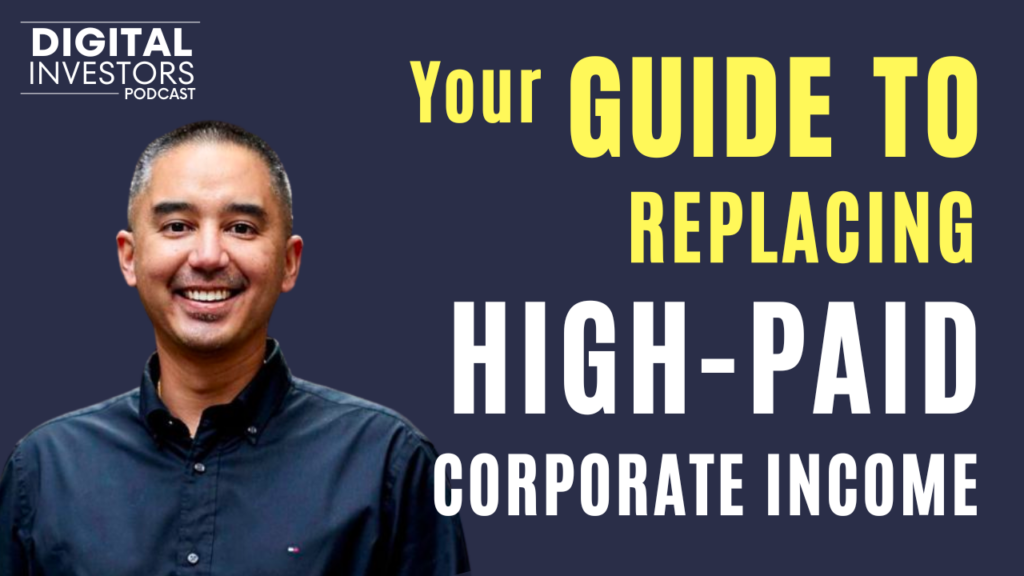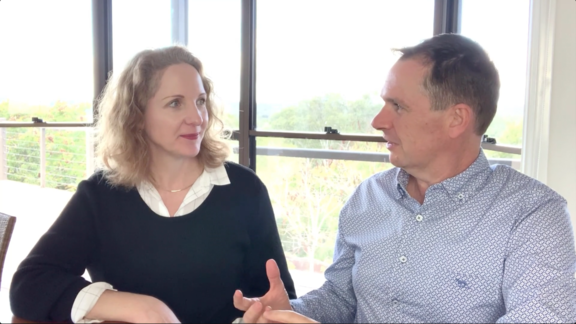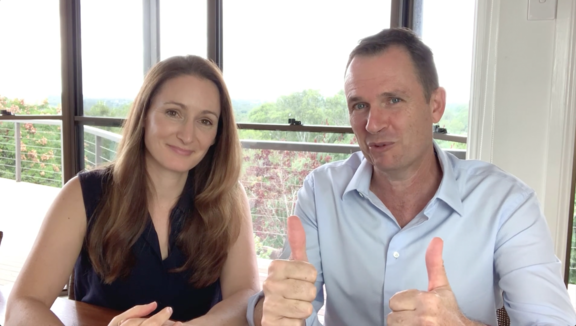Have you ever started something new, uncertain of your abilities or if you will be successful?
That’s how Calem felt when he transitioned from a corporate background to learning about digital marketing. By getting coached and mentored, he gained not only the technical skills to succeed online but the belief that he can do it.
Now, Calem and his partner, Jenn, helps others do the same. He’s like a guide, showing online beginners how to follow the path he took, a path that replaced his corporate six-figure incomes.
If you’re looking for a safe proven path to break free from the office routine and create your own online lifestyle business, Calem’s journey is the blueprint you need. He knows the quickest route, the obstacles to dodge, and the shortcuts to take.
Calem’s story isn’t just about getting rich quick. It’s about who you become as you create your own success.
Join us as Calem reveals his journey and the strategies that can fast-track your escape from the 9-5 grind. Watch the interview below to learn how to make the transition from corporate to 6-figure lifestyle business owner
Matt Raad: Hi, and welcome to the Digital Investor Podcast. I’m your host, Matt Raad.
Today, I have a very special guest for you because I’m guessing if you’re reading this, you’re on a journey to figure out how to make money online, quit your job, or create financial freedom or time freedom in your life. And today’s guest has done all that.
Not only has Calem done all of this, but he also knows what you’re about to go through. In fact, he helps all of our top students go through that very journey where they’re able to quit their jobs, too. As you can appreciate, we all sometimes need a guide on our journey. A guide who is calm has wisdom and experience and has trodden a path you are about to go on.
And so, today, I want to introduce you to Calem, one of our head coaches, our Yoda of coaches 🙂
Calem: Thanks for having me, Matt. It’s good to be back.
Matt: As you know, our goal since day one of eBusiness Institute has been to help people with this journey. Not just with practical coaching techniques and the strategies we teach but also by inspiring them to see what’s possible and to know they can change their lives.
All our students look up to you, Calem. You’re incredibly successful with this strategy. You and Jenn have created a professional digital agency in Melbourne where you can go off and travel for a quarter of the year. You both replaced your corporate six-figure incomes.
But most excitingly, you’re also a coach for us. I think that’s the coolest part, of course! How long have you been a coach for eBusiness Institute?
Calem: It would be five years now. Time flies when you’re having fun!
How Matt & Liz Raad helped Calem & Jenn transition from corporate jobs to an online business

Matt: Let’s start with your and Jenn’s journey. What were some of the initial things Liz and I were able to help you with on that journey?
Calem: That’s a good question, and I think there were two things.
The first big thing was building our belief because we didn’t think we could do it. Coming from a corporate background, this was such a new skill set for us. So, the belief you instilled in us was that it is possible and that we could do it.
The second thing was the focus. Even today, I joke with Champions that all the digital strategies you teach at eBusiness Institute are great. But also, the bad thing is that they’re all so great! So, it can be hard to pick which strategy to follow.
But you really helped us with that because you knew a big part of our journey, especially in the early days, was that we wanted to leave work and create options for ourselves.
Matt & Liz Raad gave us clarity on what it would take to replace our income and ultimately leave work.
That’s what you helped us with the most in the beginning.
Matt: What were your corporate roles?
Calem: I came from a corporate HR background, working in many industries. And Jenn was in corporate finance. We were both in the skyscrapers, working in the city and doing long hours. And there was a lot of stress involved.
The good thing was we were both paid well for what we did. But again, that’s also bad because it made it hard to leave and replace that type of income.
They were able to leave their corporate jobs within 2 years of reskilling in digital
Matt: Can you remember how long that journey took you both to leave your corporate roles?
Calem: It was inside of two years. Once we had the clarity of what was possible and the strategy we would follow to achieve it, it was actually about 12 months, to be honest. Before that, we had 12 months of learning.
So, if you count six to 12 months of learning and 12 months of making it happen, it was a two-year journey for us.
Matt: That’s awesome. And did you have any online experience back then? You’re a guru at building websites now, but what was your background in terms of technical skills?
Calem: Well, I liked being online, using Google and social media, etc., but I didn’t have any digital skills as such.
For my corporate role, I worked on a computer. But again, HR is a very interpersonal-type role. So, when I worked on a computer, it was just using systems and programs. Everyone who works a desk job has a certain program they need to use.
Matt: It’s amazing how you can completely retrain in digital.
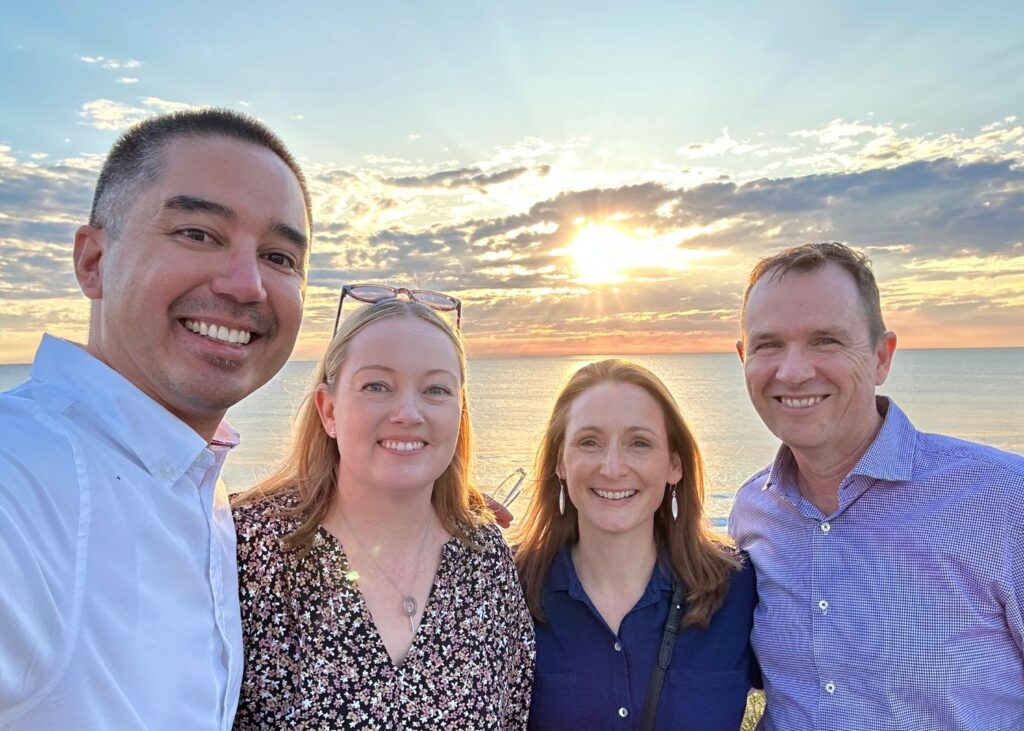
Calem has built websites for network TV shows through to Corporate Businesses
Matt: Let’s mention some of your successes. You’ve had some great wins with some of the big corporates you’ve built websites for.
Calem: Yes, well, at the start of our journey, you might remember we built websites for big cooking shows on Channel 10.
Today, we work with a lot of larger corporates across the east coast and nationally across Australia. We work with professional service-based companies, including IT businesses and different trades.
Matt: And you’ve found that you’re at the point now where it’s quite flexible. You and Jenn both work from home, and you get to travel a lot.
Calem: Yes, we travel quite a bit for family and leisure. So, we have good flexibility to be able to do all that.
…And has been able to do this with a small, but highly skilled team
Matt: What size team do you have for your business?
Calem: We have four core people in our team. And then we have some specialists who we bring in when we need them. So, overall, we have under ten people, maybe six to seven.
We’ve built our team in a way that allows for flexibility so that we can all work remotely. We’ve put the systems in place to keep operating and stay connected, no matter where everyone is.
In our mind, that’s allowed us to build a team where I feel we have the best people working for us rather than just hiring people who are located physically near us. We’ve built a remote team that keeps the flexibility to do what we do best from anywhere.
Matt: Knowing what you know now, when people are looking to build websites or online businesses, or they’re going to buy and sell websites, is building a team a key thing you suggest people look at?
Calem: Absolutely. Building a team is important for sure. But I will say it doesn’t have to be a huge team.
There are people who have built teams of 20-30 people, and that’s great. But we’ve been able to build a significant business, plus work on our own projects, with our core team of four.
The attractive thing about this business is you can do it from anywhere. I have always been interested in design and development. And I can’t believe I’m saying this, but I geek out on keyword research now, too. So, you can do that from anywhere.
But this is where you really get some leverage. When you can start to leverage your time with a core group of people, that’s where you can see more results over time and have a bit more freedom. And that’s an awesome equation to have.
This team has allowed them to focus on delivering strategy and value
Calem: As we’ve progressed and built the team, we’ve focused on ensuring we’re doing the high-value stuff.
There’s a lot of high value in everything we do. But we’ve defined our high-value tasks as doing the initial keyword research so we can see how that will influence the project. And then, we have the quality control and touch-up at the end.
This means that the team manages a lot of the “doing tasks” in the middle. Realistically, I know it will probably come back at 80% right at best. But that’s okay. By having someone else do 80%, and another 80%, and another 80%, and then me doing my 20%, I know that’s more than my 100%.
So, that was a big turning point for us. You shared the power of that with us in the beginning, which really helped. We can now focus on those high-value pieces and know we can ultimately deliver more.
How Calem uses his online business experience to help others build their 6-figure business
Matt: Okay, so let’s look at the journey of how you’re able to help our clients because you’ve been successfully coaching our students for so long now.
When we share all these success stories in our interviews, you are often there behind the scenes, helping these guys. So, what are the sorts of things that are helping these students create six-figure businesses?
1./ Have a clear goal
Make sure your reason why is one that gets you out of bed
Calem: It comes back to the first call we had with Matt and Liz Raad, which was about having a clear goal (a clear reason) why you’re doing this.
And again, I sometimes joke with students when on Digital Investors and Champions calls; you don’t come onto the program because you have a whole bunch of extra time and money. You come onto these programs to learn a specific skill for an outcome. This is just the vehicle to get us there.
For example, I went to the gym this morning. And I don’t go to the gym just for the sake of going to the gym. I go to the gym to get fit and strong and to live a better quality of life.
So, building sites and doing keyword research can take a bit of effort. But you need to know why you’re doing it. That’s a big thing we locked into when we started our journey. And your why isn’t actually about money, but rather what money can get you.
Money is a nice gauge because you can say, “This is what $10,000 or $20,000 etc. a month can do for me.” But usually, you’re actually doing this for a nicer house, or a nicer car, or more travel or time with family or the kids, etc. All those things are great but lock into whatever it is for you. The $10,000 a month is just how you can afford the things you want.
Also, your why needs to be something that gets you out of bed, even when you don’t want to. $10,000 a month won’t necessarily do it for you, but knowing you can spend quality time with the kids will.
You really want to lock into why you came onto this program in the first place. Why did you decide to reskill in digital? – Calem Koek
2./ Focus on helping people
Why selling is more effective when you’re focused on the client instead of you…
Matt: When you started on this journey, there was a big needle mover for you to help you make quick cash flow, right? You did the local business strategy because that was the quickest way for you to leave your corporate roles and go back to a high income.
But getting the clients in is one of the key bottlenecks in that strategy. And what I love about what you do with our clients, especially those students who are beginners (and even more advanced) who are quite shy or nervous, is you give them advice about how to get out there and make sales happen.
You are very good at helping our students get out there, making those sales happen, and showing them how to network. What sort of things are you helping them with? What’s some advice you can give to our readers?
Calem: It’s a good question because everyone comes from such different walks of life. Some people are corporates (like myself), some are stay-at-home parents, some have graduated from tertiary education, and then there’s everything in between. There are so many different backgrounds here.
And so, we’re out there focusing on the sale because we need the sale to build the revenue to replace our income or provide us with some options. That’s ultimately why we’re doing it.
But the shift I’m able to get students to focus on is how can you help people? If you’ve reskilled in digital, and you can build a website that generates traffic to their business or gets the phone ringing, then you need to be out there helping people.
For example, if people around you are hungry and you know how to cook them a meal, you’re going to help feed them. So, it’s the same thing here. You literally have a skill that can put food on the table for people.
Focus on “How can I help?” instead of “How can I get you to buy from me?”. It’s such a subtle difference, but it helps shift your perspective to see who you can help, not who can buy from you.
You shared something very similar with us, Matt. If you help enough people get what they want, you’ll make enough money.
So, if you come from a place of helping people, all of a sudden, you find the right words to say when you’re networking with people.
…Selling becomes easier when you master your craft
Calem: And it also comes from doing a good job. And that’s probably the other thing I’ve talked to a lot of Champions about, which is to master your craft. It’s funny how much easier these conversations get when you believe in your skills. And to believe in your skills, you have to get out there and do the thing.
Whether it’s building websites, getting some content written, and getting them ranked, all of a sudden, it gets so much easier to talk to businesses when you have ranked a site, for example.
Matt: I want to point out that no matter what strategy you want to do, whether it’s buying websites, building them from scratch, or building them for businesses, here at eBusiness Institute, we say it all comes down to “Reps, reps, reps”.
The more websites you can practice with and play with and build, the better. And that’s one of the key things we’re super passionate about.
3./ Run your own race
Use success stories as an inspiration, not as a comparison
Matt: Calem, you’ve mentioned this to me a few times, and you’ve spoken about this at our boot camps. You’ve noticed something interesting when some people read our interviews and hear the amazing success stories of our students.
Think of all the cool people in our community like Greg O’Rourke, Amish and Avani, Steven and Melissa, Nathan and Alexa, etc. All of you students and coaches have mind-blowing stories. But the problem is other students start comparing themselves to them.
So, what challenges have you observed, particularly over the last few years? Champions are now getting success a lot quicker, so there are a lot more success stories in our community.
You’re at the forefront of working with these guys here every day. What’s one of the issues that you see when you go through their accountabilities and coaching calls? Is this a real problem when you start comparing yourself to all the success stories in our community?
Calem: It does happen a lot. You see a lot of people on this podcast achieving incredible things. People sometimes tend to compare themselves to all of that rather than get inspiration.
But it’s better to think, “How do I use that as belief and to set direction for myself?” And so, it really comes back to running your own race because you have to use these stories to see what’s possible.
…There are multiple strategies to build and buy online businesses – which one suits you?
Calem: I find it fascinating how people from all different walks of life have done the same one or two courses you offer and taken what they’ve learned in 70 different directions. It baffles me, but it’s because we have slightly different aims that we’re going for, different backgrounds that we can lean on, and slightly different interests.
So, the people who succeed are the ones who read the interviews and take the bits that appeal to them from all the different stories. “I like how that person did that.” “I like how they built their team.” “I like how they structured their business.” They’ve turned it into their own journey.
It’s really about getting inspiration from these stories and then running your own race. I looked into a lot of stoicism stuff from 1,800 years ago. And it talks about if you want to progress, stop comparing yourself to others. So, this isn’t a new problem. It is an 1,800-year-old problem.
People still compare themselves and beat themselves up, which doesn’t serve us. We have to take the inspiration and go, “Wow, I can do that, too.” And you need to ask yourself, “How do I use that as a skill and motivation to do my own thing?”
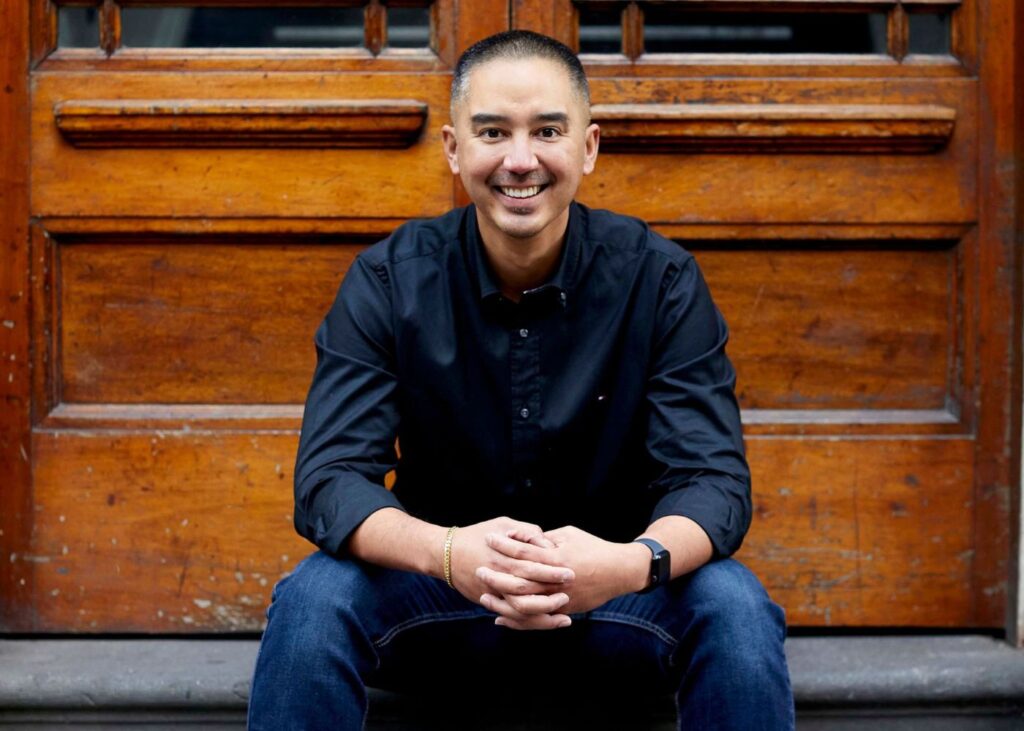
People are achieving online success much quicker now than 5 years ago
Matt: Well, a big thanks to you, coaches, because the students do look up to you guys, and they literally stand on the shoulders of giants and think what you are doing is normal. And they see inspiring interviews where people like Jing achieved online success in 12 months.
And you don’t have to do it in 12 months, quite that quickly. But the results are coming a lot quicker now. Obviously, we’ve matured as well here at eBusiness Institute. I think we’re getting better at what we’re delivering.
But it does lead to this very real problem where if you’re reading this, please don’t beat yourself up if you’re not getting results overnight. This is not a get-rich-quick thing. It’s a journey. And that’s one of the big things.
Calem, I know you are really good at helping our community understand that this is a big mindset thing. It’s got nothing to do with their technical skills.
Calem: No, exactly. This is a journey, a conversation that comes up a lot. Please don’t compare my success in year six or seven with your year one. We’re at different parts of our journeys. Get the inspiration and know what’s possible, but understand that we’re at different points.
It’s actually very hard to move forward from a position of beating yourself up. But if we can celebrate those little wins along the way, they really do add up.
And I know we spoke of our timeframe of six to seven years to get to where we are today. But it is actually happening a lot quicker now for newer students. When I realistically look at what we’re achieving, these are 10-year goals for us, and we’ve hit them. And so, now we reset and work on the next level.
What we achieved happened much quicker than we thought, but some things took longer than we’d like. And that’s all part of the journey. Of course, we want everything to happen in one or two years. But honestly, what we achieved happened in five years instead of 10. So, we’re already two to three years ahead and ready to go to the next thing. It’s just focusing on the journey.
I know one thing you share, Matt, is from Jim Rohn, “Don’t become a millionaire for the money, but for who you become.” And you do change through this process and start to lock into why you’re doing all these things.
So yes, it takes time to make this change, but I spent almost as long at university. We completely changed the trajectory of our lives in the same timeframe. We now get to travel when we want, get to be with our family when we want, all those kinds of things. So, in the grand scheme of things, it’s not long.
Matt: And you get to change lives by being a coach with us.
Learn from other people’s experiences to fast-track your online results
Matt: I want to acknowledge what an awesome job you and Jenn do with helping our community, along with all the other amazing coaches. I know you’ve changed a lot of lives just by people being able to tap into your wisdom and hearing your personal story.
The good thing about you doing this for so long now is you know what our students are going through. When starting as a beginner online, sometimes you need a guide. I’d like to think we are good people here at eBusiness Institute. And as you can see from Calem today, he’s an awesome coach. He’s also done an incredible job for his clients when building websites for professional corporates in Melbourne.
Thank you so much for sharing with us, Calem. You’ve given us nearly a decade’s worth of wisdom and distilled it down for us on this journey to the key MRA (Maximum Return Activities). You’ve shared with our readers what you need to keep in mind and where to focus.
Hopefully, our readers can appreciate a lot of mindset sitting in there, which we are also passionate about teaching. Thank you so much for everything you’re doing to help people in our community, Calem.
Calem: Thank you, Matt. It’s great to be a part of it and be able to share.
If you liked this and want more, check out the interview on how a single parent makes 6-figures by retraining in digital.
You can also register for our free masterclass on how to buy & renovate websites to create cash-flow and assets in the new digital economy.


